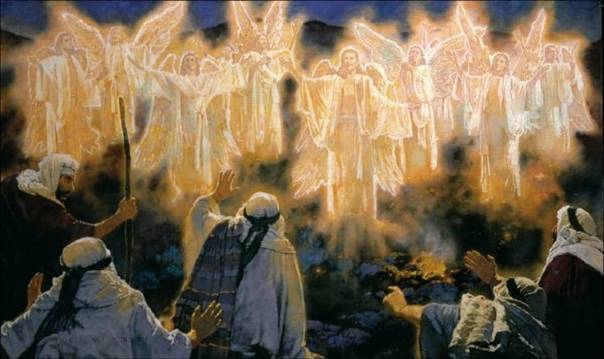
14 July 2014 by Dr Yeo Teck Thiam –
We usually use the word ‘angels’ to encompass spiritual beings that are with God in heaven. This is the heavenly host that we rejoice to hear, for they help us or bring good tidings, when they come as commanded by God.
Our ideas about angels, of course, have areas in similarity, but differ also because we are impacted in different ways by our culture, philosophy and spiritual perceptions. Other differences also arise when words that we use may not precisely mean the same things in another language.

As a result, we often complain about problems like, “We are not talking on the same frequency” or “That is not what I mean!” Thus we are painfully aware that we may use the same words, but these communicate different things to another person.
This is particularly exasperating when a word has several meanings, or are some subjects like angels, faith, or love which no one can actually see, yet experience in life. Hence, on a subject such as angelic beings, I think it is helpful to clarify some ideas.
About Angels
The word ‘angel’ corresponds to the Greek ‘angelos’ that is used in the New Testament. The Greek word commonly means ‘messenger’ in general content. This is, in general, the picture we have of “angels” who bring God’s message to us.
This Greek meaning in the New Testament has some divergence from Hebrew words used in the Old Testament. It is important to note the differences, as Hebrew words for angelic beings relate more clearly with cherubim and seraphim.

Thus in the Old Testament, we read more of ‘cherubim’ and twice of ‘seraphim’. These are about celestial beings that we commonly associate with angels.
Nevertheless, angels are God’s ministers and they perform many works besides being God’s messengers to us, as we generally perceive. For we also know many angelic beings have tasks in ministering to us, and be our guardian angels.
Malak Yahweh
The equivalent of ‘messenger’ in Old Testament is the Hebrew word ‘malak’ and its plural ‘malakim’. This Hebrew word is, of course, translated into English as “angel” and as “messenger” as well.
In the Old Testament, ‘malak’ and ’malakim’ are easily understood when it refers to human messengers. This is because a messenger can be human or angelic. This is clear, even for Haggai 1:13 when the prophet was described as ‘malak’.

“Malak’, of course, does mean ‘angel’, and we see this meaning in passages such as Psalm 91:11, Zechariah 6:5, and Genesis 19:1. So, we realize Hebrew words’ meaning often depend on the passage. However, this word is surprisingly not commonly used to describe angels.
Instead, in the Old Testament, ‘malak’ is used specifically to refer to a particular person known as ‘Malak Yahweh’ in Scripture. ‘Malak Yahweh’ as many know, is the title for “the angel of the LORD”, and is the angel of God’s Presence with us.
God’s name is in Him, as given in Exodus 23:21. So, Scripture shows that Malak Yahweh is God. This needs to be discussed separately, so I will pass by this, here.
Seraphim
This word is used only on two occasions in Scripture. It has reference to the meaning of ‘burning’ in Hebrew. It occurs in Isaiah 6:2,6. Thus Isaiah is the only place in the Bible that specifically mentions seraphim.
These seraphim were in God’s Presence, and Isaiah saw them around the throne of God, and calling to one another:
“Holy, holy, holy is the LORD Almighty;
the whole earth is full of his glory.”
One of them flew to Isaiah with a live coal from the altar. The coal touched Isaiah’s lips to cleanse him because he was in God’s Presence. We see that this meaning of ‘burning’ is in some relation to holiness and worship. The need for Isaiah to be blameless before God was clearly necessary. This was symbolically enacted by the burning coal to cleanse Isaiah of his sinfulness.

In the New Testament, John was taken up in the Spirit to the throne of God in Revelation 4:1. In this vision, John saw four living creatures and twenty-four elders in God’s Presence. The living creatures sang a similar song:
“Holy, holy, holy, is the Lord God Almighty,
who was, and is, and is to come.”
Since this scene is similar to the one that Isaiah saw, I think the nondescript living creatures are seraphim, for they were doing identical duties. We shall seek confirmation for this thought from other Scripture passages.
In this context, the seraph angels were singing, for they would hardly be just calling out to pass a message to one another. Rather, it makes better sense that they were singing the praises of God, and to proclaim the beauty of the LORD. Hence, we have a description of seraphim leading in the worship and praise of God.
A Heavenly Choir

The heavenly choir was seen and describe by John in Revelation 5:11, where a great company of angels, numbering thousands upon thousands, encircled the throne and sang in a loud voice. Thus we must not confine angelic singing only to seraphim.
To this end, when Jesus was born, the heavenly host that appeared to the shepherds was a heavenly choir that includes seraphim. For the heavenly host that appeared with the angel announcing the birth of Jesus in Luke 2:13 were praising God and saying,
“Glory to God in the highest,
and on earth peace and goodwill to men
with whom God is pleased.”
The three fold proclamation of praise is similar to “Holy, holy, holy, is the LORD Almighty” that we read in Isaiah 6:2. In Revelation 5:12, this also has a seven attribute of perfection in Jesus.
“Worthy is the Lamb, who was slain,
to receive power and wealth and wisdom and strength
and honor and glory and praise!”
So I think of angels singing and praising God in heaven and the heavenly choir included the lead of seraphim in worshipping God. Likewise, we think of other instances where angelic singing is mentioned in Scripture, and ask God to open our eyes to see.
Cherubim
Seraphim may be a specific class of angels, while cherubim are the general description for a group of angelic beings. We will see this when we consider what Ezekiel wrote.
The word ‘cherubim’ occurs frequently in the Old Testament. It is the description most frequently used in the Old Testament for angels. Cherubim seem to be entrusted with various important functions.

In Ezekiel 10:1-3, these angelic beings were also around the throne in God’s Presence. Ezekiel referred to them as cherubim, yet they were among the fire of burning coals. Ezekiel also said these were the living creatures he saw by the Kebar River in Ezekiel 10:15.
Thus, Ezekiel said that he realised the living creatures were cherubim whom he saw in God’s Presence in Ezekiel 10:20. They have duties in the worship of God, as we understand. So, I consider this together with what John and Isaiah saw in their visions. So I think it is clear that “seraphim” mean a specific group of cherubim.
NOTE: This is the first part in an article on angels by Dr Yeo. Mr Yeo Teck Thiam is a retireer who used to work as a chemical engineer, specializing in food and perfume chemistry for an international food company and perfumer. His other main interest is astronomy and other mathematical matters, relating to the Biblical passages.
|Share The Good News|




Excellent.